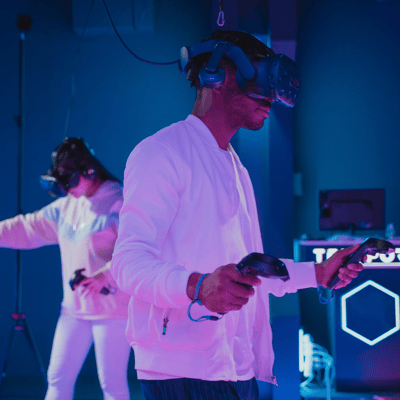
The Metaverse and Web 3.0 — these two terms have several things in common, but one that stands out above all is how they’re often misunderstood by the average person.
While there has been a definite increase in their usage, the truth is that we’re still in the early stages of the infrastructure being built. Everyone has a different idea of what the Metaverse and Web 3.0 will look like, and it leads to a significant amount of confusion.
In this article, we’ll go over the basics of these terms as they currently exist, and how they will affect your digital marketing tools and tactics.
 What Is the Metaverse?
What Is the Metaverse?
Similar to the settings of movies like “Ready Player One” or “The Matrix,” the proponents of the Metaverse envision it as a virtual reality where users are free to interact in ways that mimic the real world — they can play games, watch shows, hold business meetings, go shopping, or simply stand around and chat.
In the shows and movies, users typically “plug in” to the world via sophisticated virtual reality (VR) and/or augmented reality (AR) technology, allowing them to completely immerse themselves into the virtual world and all its associated glitz and glamor.
As it stands, our current technology isn’t quite as sophisticated or accessible yet. VR headsets are mostly seen as expensive game accessories. The “metaverse” that we are able to interact with right now is mostly just a collection of immersive virtual environments, such as games like Fortnite or Roblox or platforms like Decentraland.
What Is Web 3.0?
To understand the concept of web 3.0, you first have to understand web 1.0 and web 2.0 — these three are considered as the “phases” of the internet.
Web 1.0, or the era of 1994 to 2004, can be thought of as the time that the internet was mainly a tool for finding information. Content was sparse, and there were significantly more people consuming rather than creating. Interaction with your fellow users was largely limited to email, chat forums, or blogs.
This changed beginning in 2004, moving us into web 2.0 — the social internet. Nowadays, everyone has a smartphone in their pocket, allowing them to connect instantaneously with other users on various websites and mobile apps. User-created content is everywhere, from YouTube videos to Facebook posts. Many of the prominent platforms today are run by extremely powerful companies, though, which is the problem that web 3.0 seeks to address. Those who have experienced these platforms know that they are capable of disregarding your privacy, censoring content, and using your data for profit.
Web 3.0 touts the idea of a “decentralized” internet, where the power is in the user’s hands. Blockchain technologies and decentralized autonomous organizations (DAOs) are integral to building an internet that doesn’t rely on servers controlled by a handful of individuals or corporations. In theory, everyone will have access to the systems and networks that run applications and store personal data. This ensures democracy.
Digital Marketing with Web 3.0 and the Metaverse
Now, you have a better idea of what web 3.0 and the Metaverse entail, but what exactly will it mean for the way you do digital marketing? As more users take an interest in interacting with the virtual, blockchain-based world, you need to transform your approach accordingly. Here are several key areas you’ll have to consider:
UX
UX, or user experience, is already an important facet of digital marketing. When you bring the Metaverse into it, a responsive, interactive, and user-friendly interface becomes even more critical to your success — the immersive environment means that users will be interacting with your platform closer than ever before. You’ll need to ensure your websites, apps, or online stores are well-designed and ready to be experienced in 3D.
 VR/AR/AI
VR/AR/AI
Virtual reality, augmented reality, and artificial intelligence are tools that are already at your disposal. With VR, you can let your target audience experience your products or services in an immersive way, without having to be in the same physical store or showroom. Meanwhile, with AR, you can combine elements of the physical world with digital components, such as having digital items on display in a physical store. AI, on the other hand, can be used for a variety of different applications, from
Experiences
Right now, you’re browsing the internet through a computer or a mobile device. In the future, you might be browsing the internet through a VR headset, moving through the space rather than staring through a screen.
Getting a hang of the immersive, interactive environment is absolutely essential for marketing to Metaverse users. After all, you want to give them a memorable experience. A good example is Gucci partnering with Roblox to host Gucci Garden, where users could view, try on, and buy digital Gucci products for their avatars.
Community-Driven Efforts
Your audience is one of your most valuable resources in the decentralized internet. Rather than continually creating content yourself, you want to be able to engage your audience and encourage user-generated content.
Content created by the community is oftentimes more powerful in building brand awareness and trust. This is primarily because average people are not trying to sell anything, so others know that their recommendation is honest and unbiased.
NFTs
NFTs or non-fungible tokens allow you to claim ownership of an asset on the internet, whether it be a piece of art or a plot of virtual land. Many companies are beginning to mint their own NFTs, allowing users to own a piece of the brand. These include content such as videos, tweets, or blog posts. Some of these NFTs come with exclusive perks, such as access to a membership club.
Conclusion
The nebulous concepts of the Metaverse and web 3.0 might seem intimidating to tackle, but if you want to see success in your digital marketing efforts in the future, it’s better to learn the ins and outs sooner rather than later.
with us at Connection Model today. As experts in digital marketing, we’re more than ready to help you determine the tools and tactics you need to succeed in the internet of the future.

Leave a Reply